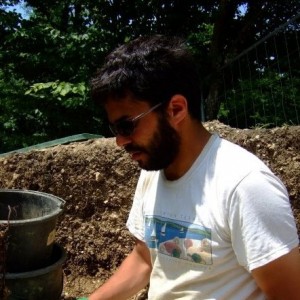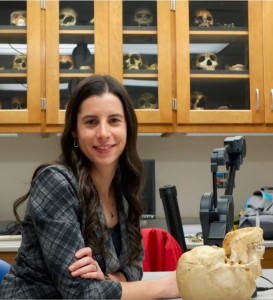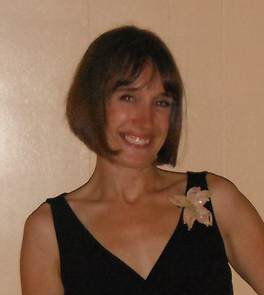The Department of Sociology and Anthropology at Ohio University invites applications for a tenure‐track Assistant Professor of Anthropology in biological anthropology beginning in August 2015. We are interested in candidates with research and teaching specialization in human evolution, human diversity, and/or primate behavior and conservation. The specific research area is open. Ideal candidates will demonstrate an active and innovative research program and will be committed to excellence in undergraduate teaching. The successful candidate will be expected to teach upper‐level courses in Human Evolution and their areas of expertise, as well as Introduction to Biological Anthropology. Anthropology faculty at Ohio University currently teach 2 courses per semester: 1 upper‐level course and 1 Introduction to Biological Anthropology course. Housed in the Department of Sociology and Anthropology, the Anthropology Program (http://www.ohio.edu/socanth/
Nominations Due: May 1 to Suzanne Mattingly, AAA CoGEA Liaison at smattingly@aaanet.org.
The CoGEA Award (formerly known as the Squeaky Wheel Award), sponsored by the AAA Committee on Gender Equity in Anthropology (CoGEA), recognizes individuals whose service to the discipline, and the collective spirit of whose research, teaching and mentoring, demonstrates the courage to bring to light and investigate practices in anthropology that are potentially sexist and discriminatory based on gender presentation.
The Institute of Peruvian Studies (IEP), one of the most prestigious research institutions on the social sciences in Latin America, announces the third season of its international field school in archaeological methods “Peruvian Central Coast”. Our field school offers training in mapping, survey and excavation techniques in the field as well as basic training via onsite workshops on statistical sampling in archaeology, bioarchaeological analysis, ceramic analysis and cataloguing, and lithic analysis. Prior experience in archaeological fieldwork is not required.
Continue reading Archaeological Field School Peruvian Central Coast
As the co-editors of the AFA’s (Association for Feminist Anthropology) Anthropology News section notes, we are looking for submissions for both in print and online columns. This is a great opportunity to share your research with the readers of AN and support feminist research in humanities and social sciences!
There are no limitations on themes. Any contribution/report that focuses on feminist anthropological concerns and/or employs feminist research methodology is welcome.
 The winner of the BAS Student Paper/Poster Award for 2013 is Marc Kissel (University of Wisconsin, Madison) for his paper, “Testing Genetic Models of Human Evolutionary History against the Anthropological Record.”
The winner of the BAS Student Paper/Poster Award for 2013 is Marc Kissel (University of Wisconsin, Madison) for his paper, “Testing Genetic Models of Human Evolutionary History against the Anthropological Record.”
Comparing measurements of supraorbital skeletal features from two Neandertal populations (Vindjia and Krapina), Kissel explores whether genetic drift or natural selection best explains observed morphological variability. Having found that observed variability cannot be explained by drift alone, he suggests that closer attention be paid to human reproductive behavior as illustrated in ethnographic record of hunter-gatherer communities, and that effective population size may not be a good indicator of census size in the Pleistocene.
 Honorable mention for this prize went to Jill E. Scott (University of Iowa) for her paper, “A 3-D Morphometric Analysis of Mandibular Symphyseal Variation in Homo.”
Honorable mention for this prize went to Jill E. Scott (University of Iowa) for her paper, “A 3-D Morphometric Analysis of Mandibular Symphyseal Variation in Homo.”
In this paper, Jill Scott tests whether various measurements of chin morphology can be used to successfully differentiate H. sapiens, H. neanderthalensis, and H. heidelbergensis. Using Principal Component Analysis, she finds that H. sapiens separate from both Neandertals and H. heidelbergensis along PC1. However along PC2, H. sapiens group with Neandertals to the exclusion of H. heidelbergensis. In this study, she explores new ways to measure and statistically test morphological differences that have been explored primarily in a qualitative manner in the literature.
BAS Student Representative Sarah Livengood initiated an informative survey to investigate the barriers to student participation in AAA. Eighty percent of 113 respondents indicated that they had never attended a AAA meeting. In large part this is because students don’t feel they have anything to present, but the cost of membership and registration is also an important factor. Students also indicated that they would be very interested in mentorship programs and sessions on professionalization. BAS is committed to engaging biological anthropology students in the broader discipline of anthropology and in AAA activities in particular and this preliminary survey sets the stage for future action.
BAS members are invited to submit pieces to the AAA Writers Circle. As explained at the link below, this is a project meant to encourage anthropologists to write op-eds and magazine articles, and to engage in other ways with public media:
http://www.aaanet.org/resources/AAA-Writers-Circle.cfm
This is an opportunity for biological anthropologists to convey the importance of our science to broad audiences. Please feel free to contact Dr. Barbara J. King about this.
III Edition now launched! – 24 August – 6 September 2013
Following on the successful first two editions, attended by students and professionals from all over the world, Trento Science Museum (Italy) and the University of Trento, in collaboration with Tanzania National Parks and the Danish Natural History Museum, announce the third edition of the Summer School on Tropical Rainforest Biodiversity to be held in the Udzungwa Mountains National Park, Tanzania, during 24 August – 6 September 2013.
The school will be based at the Udzungwa Ecological Monitoring Centre, a field station annexed to the Udzungwa Mountains National Park and managed by Trento Museum.
All information about the summer school can be downloaded following the links below (registration details will be posted soon). You can also contact udzungwa.school@gmail.com for further information.
The winner of the BAS Student Paper/Poster Award for 2012 is Michaela Howells (University of Colorado, Boulder) for her paper, “You Just Have to Wait: The Impact of Marital Status on the Pregnancy Outcomes of Samoan Women” with co-authors Richard Bender, Darna L. Dufour, John Ah Ching, and Bethal Mua’sau.
Julienne Rutherford has been selected as a AAA Leadership Fellow
We are very pleased to announce the winner of this year’s student prize for outstanding presentation:
Meredith Ellis (Syracuse University) for her paper, “A Disciplined Childhood: A Social Bioarchaeology of the Subadults of the Spring Street Presbyterian Church”. This paper is going to be published in an edited volume by Jennifer L. Thompson, Marta Alfonso-Durruty, John J. Crandall, “Tracing Childhood: Bioarchaeological Investigations of Early Lives in Antiquity”.
We are also pleased to announce a runner-up:
Valentine Volk (Cleveland State University), for her paper, “A Preliminary Assessment of Health and Disease at the Late Woodland Mayer Site, Vermillion, Ohio”.
The 2011 W.W. Howells Book Award was presented to Wenda Trevathan for her book, Ancient Bodies, Modern Lives: How Evolution Has Shaped Women’s Health. Oxford University Press.
The book was recognized as an insightful and compelling consideration of the importance of evolution to women’s biology and health.
“Written by a leading light in the field of evolutionary medicine, Wenda Trevathan’s Ancient Bodies, Modern Lives describes how many contemporary health problems, particularly those of women, are the result of a mismatch between our “Stone Age” bodies that evolved over millions of years and our current (and radically changed) life styles. Thorough, authoritative, and easy to understand, this book offers suggestions for making informed decisions that impact the health of contemporary women and that of their children and their children’s children. Run, don’t walk (or stroll bipedally), to give this important and elegantly written book to your favorite bride-to-be, mother-to-be, mother, grandmother, or great grandmother! Inquisitive men will also find this book engaging.” –Dean Falk, Ph.D., Hale G. Smith Professor of Anthropology, Florida State University.
Nelson Ting, Ph.D.
Department of Anthropology
University of Iowa
Applications for the Primate Conservation Summer Study Abroad Program in Tanzania are now available (follow this link). The applications are due by March 15th and the program is open to both undergraduate and graduate students.
The Dmanisi Field School is a four-week program that provides a unique opportunity to engage in ongoing excavations and acquire practical archaeological skills in combination with theoretical knowledge at one of the world’s most important prehistoric sites in an amazing setting! See flyer.
Badia Pozzeveri (Lucca Province), Italy – July 25 – August 19, 2011
The Field School in Medieval Archaeology and Bioarchaeology at Badia Pozzeveri is an accredited academic program offered by The Ohio State University and the University of Pisa. The field school aims at training students in archaeological and bioarchaeological field and laboratory methods.
The field school is an outstanding opportunity for students to gain practical experience in archaeological excavation and bioarchaeological investigation by working side-by-side with leading researchers in the field. Follow this link to read more.
June 30th – July 21st, 2011
at Cueva Negra del Estrecho del Río Quípar,
July 21st – August 11th 2011
at Sima de las Palomas del Cabezo Gordo
Director: Michael Walker, DPhil,BM,BCh,MA,DipPreArch, FSA
Professor of Physical Anthropology
Dept. of Zoology and Physical Anthropology,
Biology Faculty, Campus Universitario de Espinardo,
Universidad de Murcia, 30100 Murcia, SPAIN
Web-page http://www.um.es/antropfisica
Emails: walker@um.es or mjwalke@gmail.com
Excavation has been ongoing for 20 years at these two sites. Cueva Negra has 6 teeth and possible long-bone fragments of pre-Neanderthal hominid remains (H. heidelbergensis), a final Early (i.e. Lower) Pleistocene fauna and Acheulian and Levalloiso-Mousterian Palaeolithic artefacts in a sedimentary deposit from a time somewhere between 780,000 and 990,000 years ago according to both biostratigraphy and now palaeomagnetism (Scott & Gibert, 2009, Nature 461:82-85). Sima de las Palomas has >300 skeletal parts (teeth, bones) of 9 or 10 Neanderthal individuals, including 3 articulated skeletons one of which is 85% complete from between 60,000 and 40,000 years ago, an early Late (i.e. Upper) Pleistocene fauna and Mousterian Palaeolithic artefacts, dated by 14C, U-ser, OSL and ESR.
1. Excavation of the Roman Baths at Carsulae
June 12 – July 23, 2011
This is the sixth season of excavations of the Roman Baths at the ancient city of Carsulae . The Roman city, founded along the via Flaminia in the late third century BCE, is located near the town of San Gemini . The area has been associated with healing waters since pre-Roman times. Field school includes: archaeological excavation, various methods of excavation documentation and handling and processing of artifacts.
Contact: Jane Whitehead, excavation director and professor at Valdosta State University , e-mail
Further information: http://www.valdosta.edu/~jwhitehe/Carsulaeweb/Carsulae_home.htm
2. Conservation of Archaeological Ceramics – Classes and Workshops
May 23 – June 18, 2011
The course aims to give basic knowledge and hands on experience in the field archaeological ceramics conservation. Through classroom and workshop sessions the participants will be introduced to the following skills: categorizing, organizing and storage of sherds; materials and morphological analysis of diagnostic pottery; graphic and digital documentation of diagnostic pottery; cleaning, reassembly and integration of lacunae of pottery. Some of the work in the workshop will be done using recently excavated materials from the Baths of the ancient Roman town of Carsulae .
Contact: Max Cardillo, San Gemini Preservation Studies, e-mail
Further information: www.sangeministudies.org
syllabi
The American Anthropological Association invites minority doctoral candidates from any subfield in anthropology to apply for a dissertation writing fellowship of $10,000.
Deadline: February 15th 2011.
Follow this link for details.
BAS 2010 student award winners:
Allison Foley (paper)
DISABILITY AND DISEASE IN THE ANCIENT MIDWEST: A PALEOPATHOLOGICAL ANALYSIS OF THE MORTON SITE, IL Continue reading 2010 AAA BAS Student Paper/Poster Award Results
